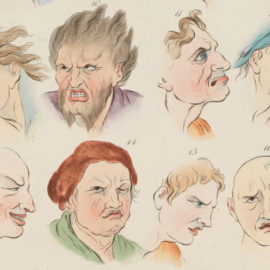

This article is an excerpt from the Shortform book guide to "101 Essays That Will Change the Way You Think" by Brianna Wiest. Shortform has the world's best summaries and analyses of books you should be reading.
Like this article? Sign up for a free trial here .
Where do thoughts come from? Why do you think about the world the way you do? Are your beliefs and opinions actually your own?
While you might believe that you consciously control your thoughts, you’re often not conscious of your thoughts or why you think them. This is because you never consciously chose the thoughts you habitually think or the beliefs that reinforce them. Rather, you subconsciously adopted the thoughts and beliefs of your family, your friends, and your culture.
Here’s why you don’t have complete autonomy over the way you think and how this impacts the way you interpret your experiences, how you experience happiness, and how you judge yourself.
You Subconsciously Think Like Others To Feel Happy
In the course of our lifetime (particularly, childhood), you adopt the thoughts and beliefs about the world from other people. These adopted thoughts and beliefs influence your entire worldview—how you judge the world, your place in it, and the circumstances you face. In other words, everything you’ve ever thought of as good, bad, right, wrong, beautiful, or ugly has simply been a reflection of the way other people have influenced you.
Why would you adopt the thoughts of those around you? According to Wiest, you likely found early on in life that it was the only way you could experience comfort and happiness. She explains that, as a child, your comfort and happiness depended on conforming to the expectations of other people:
- If you acted according to their desires and expectations, you were rewarded—for example, with extra attention and affection. This made you feel comfortable and happy.
- If you acted against their desires and expectations, you were punished—for example, with rejection or social humiliation. This made you feel uncomfortable and unhappy.
(Shortform note: Researchers confirm that we unconsciously internalize the unspoken rules and biases of our social groups so that we can instinctively cooperate with others. Our inherent need to feel connected to others and to avoid punishment motivates us to adopt these rules. In addition, this need for connection encourages us to spend time with people who are similar to us—the feeling of sameness enhances our sense of belonging. However, being around like-minded people makes it difficult to think differently—because surrounding ourselves with people who believe the same things we’ve been conditioned to believe reinforces our thinking patterns.)
| Where Do Thoughts Come from? The author of Psycho-Cybernetics, Maxwell Maltz, validates Wiest’s argument that you’ve been conditioned to adopt the thoughts and beliefs of those around you. He argues that, as a child, you unconsciously adopted the opinions and beliefs of others as truths, regardless of whether or not these opinions were based on facts. Why did your mind accept what you heard, saw, and experienced as truth? Because your nervous system can’t tell the difference between imagination and reality—it can only respond to what you think or imagine to be true. When you were young, you were less able to question what was going on around you and form your own rational conclusions. As a result, you simply absorbed everything you experienced, and your mind accepted these experiences as truths. Further, Maltz suggests that the conditioning process isn’t as simple as Wiest makes it out to be. He argues that you didn’t automatically adopt the thoughts that helped you to conform to other people’s expectations. Rather, the way that you identified with your experiences determined the way you thought about and interpreted similar experiences. For example, if your teacher gave you a gold star and a smile in front of all of your peers, you could have identified with this experience in multiple ways: If you were a confident child, you could have felt proud of yourself and your achievement (happy). If you lacked confidence, you could have felt embarrassed about being the center of attention (unhappy). If you wanted to impress a peer who took pride in being a delinquent, you could have felt disappointment about looking like a geek (unhappy). Though your teacher was obviously happy with you, only the way you identified with the experience defined how happy you felt about it. As an adult, you can decide what you choose to believe but, according to Maltz, the “truths” you accepted as a child continue to live in your mind and inform your thoughts and feelings. He suggests that you take control of these outdated truths and replace them with what you choose to believe by regularly visualizing yourself acting in ways that align with your authentic self (who you are beneath the conditioning). Maltz claims that, with constant practice, your mind will gradually become accustomed to accepting your new thoughts and beliefs as truth and will let go of the old, conditioned beliefs. |

———End of Preview———
Like what you just read? Read the rest of the world's best book summary and analysis of Brianna Wiest's "101 Essays That Will Change the Way You Think" at Shortform .
Here's what you'll find in our full 101 Essays That Will Change the Way You Think summary :
- Why the only way to make yourself feel better is to change the way you think
- How social conditioning influences the way you unconsciously think
- How to manage your thoughts and feelings about yourself and your experiences






